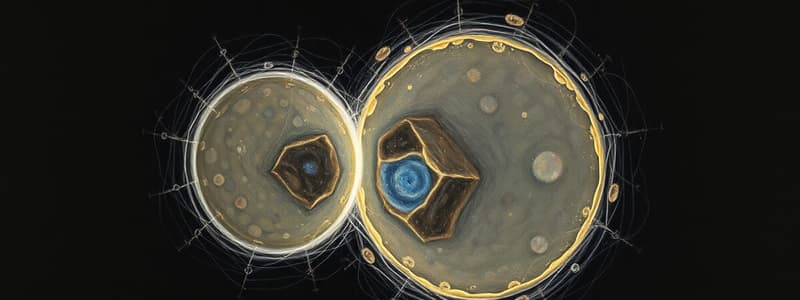Podcast
Questions and Answers
What is the cell cycle?
What is the cell cycle?
A series of events that take place in a cell leading to its division and DNA replication.
What happens during the G1 phase of the cell cycle?
What happens during the G1 phase of the cell cycle?
The cell grows, organelles duplicate, and it is metabolically active.
What occurs during the S phase?
What occurs during the S phase?
DNA replication and an increase in DNA content.
What is the function of homologous chromosomes?
What is the function of homologous chromosomes?
Define diploid and haploid chromosomes.
Define diploid and haploid chromosomes.
What are the two types of cells involved in cell division?
What are the two types of cells involved in cell division?
The quiescent stage of the cell cycle is known as the ______.
The quiescent stage of the cell cycle is known as the ______.
Match the processes of meiosis with their correct stages:
Match the processes of meiosis with their correct stages:
Sister chromosomes have different alleles for each gene.
Sister chromosomes have different alleles for each gene.
Meiosis results in the production of diploid cells.
Meiosis results in the production of diploid cells.
Flashcards are hidden until you start studying
Study Notes
Cell Cycle
- A series of events leading to a cell's division and DNA replication.
- Essential for growth, development, and repair through cell multiplication.
Types of Cells
-
Somatic Cells
- Comprise all body tissues and organs.
- Contain diploid chromosomes and undergo mitosis.
-
Germinal Cells
- Function as reproductive cells or gametes.
- Contain haploid chromosomes and undergo meiosis.
Chromosome Types
-
Haploid Chromosomes
- Contain one copy of genetic material, resulting in unique gametes.
-
Diploid Chromosomes
- Comprise two copies of genetic material, forming paired chromosomes.
Cell Cycle Phases
-
Interphase
- Period between cell divisions, including G1, S, and G2 phases.
-
G1 Phase
- Occurs between mitosis and DNA synthesis.
- Cell grows and duplicates organelles, lasting up to 11 hours.
-
G0 Phase
- A quiescent stage for metabolically active but non-dividing cells.
-
S Phase
- Involves DNA replication with increased DNA content, lasting up to 8 hours.
-
G2 Phase
- Focuses on protein synthesis and damaged DNA checkpoints, lasting up to 4 hours.
-
M Phase
- Cell division occurs, including mitosis and meiosis, typically lasting about 1 hour.
Cell Division
- Plays a biological role in reproduction and maintaining genomic information consistency.
- Ensures the production of new individuals while preserving genetic material across generations.
Meiosis Overview
- Consists of two stages, Meiosis I and Meiosis II, with key phases for genetic variation.
Meiosis I Phases
-
Prophase I
- Chromosomes condense; meiotic spindle forms; nuclear envelope disappears.
- Stages include:
- Leptotene: Chromosomes condensation starts.
- Zygotene: Homologous chromosomes pair (synapsis).
- Pachytene: Bivalent forms and crossing over occurs.
- Diplotene: Coiling occurs, with chiasmata holding chromosomes.
- Diakinesis: Final condensation, tetrads become visible, and nuclear membrane breaks down.
-
Metaphase I
- Chromosomes align at the metaphase plate, attached to meiotic spindles.
-
Anaphase I
- Homologous chromosomes are separated and move to opposite poles; sister chromosomes remain attached.
-
Telophase I
- Homologous chromosomes reach the poles; nuclear envelopes form, followed by cytokinesis.
Comparison of Mitosis and Meiosis
-
DNA Replication
- Occurs during interphase for both but is crucial before mitosis and meiosis.
-
Divisions
- Mitosis involves one division while meiosis involves two.
-
Synapsis
- Does not occur in mitosis, while it is a key event in meiosis during prophase I.
Studying That Suits You
Use AI to generate personalized quizzes and flashcards to suit your learning preferences.




